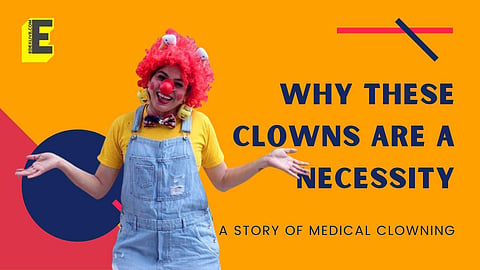

Is laughter the best medicine? If not the best, it does help lift your mood and that helps in recovery. But hospitals generally wear a gloomy look with diseases, anxiety and a whole lot of seriousness. Sheetal Agarwal and her group of clowns are here to fix that. Yes, you read it right. They are a group of clowns — not those who made you laugh at a circus, but this group — the Clownselors — practices medical clowning. They are a Delhi-based volunteer-run group that interacts and performs different acts for children and adults at hospitals, old-age homes, orphanages, special schools, shelter homes, refugee camps, schools, universities and workplaces — all while being dressed as clowns. They want to "use humour to expedite the healing process" they say. Oh, and they give free hugs too. How cool is that?
Sheetal hadn't planned to get into this profession till she was in her thirties and setting up Clownselors was never the plan. "I was teaching as a lecturer of Social Anthropology at Amity University after having worked for the government as a researcher when we went on a retreat to Ahmedabad in 2016. There I met Dhara, a woman who introduced herself as a medical clown. I had never heard of the term but I read up and the idea of going to a hospital and making someone smile intrigued me," she said. Sheetal holds an MPhil in Social Anthropology from Delhi University and a Master's from JNU after completing her graduation from DU.
Dhara told Sheetal that no one was doing this in Delhi but suggested that she could start medical clowning herself. "But I shrugged it off, saying that I didn't have a background in theatre nor did I know how to go about with the project. Dhara said that someone from their team can do a workshop with us. We would need 15 volunteers and one hospital's permission to start with," said Sheetal. But she did not take any action immediately. "One night, when I couldn't sleep, I posted on Facebook asking people if they would be willing to volunteer for something like this. People were interested. I got 33 responses," added Sheetal.
But this didn't really work out at first. The workshop never happened, out of the 33 only five turned up on the first day. "I had approached the Delhi government and they were interested. During the second meeting, they also called the then Director of the Chacha Nehru Bal Chikitsalaya, Dr Anup Mohta. He had watched (videos of) Patch Adams, who had started medical clowning. He said that we can definitely try this and there won't be any side effects. I went for a recce and then, on July 9, 2016, we had to start. But only five people turned up and we really did not have any idea how to go about it," said Sheetal.
But things changed when they got inside the hospital. "Luckily, on the first day, we had a street performer with us who helped with some basic tricks and I remembered some from watching tricks at the circus. We went in as a human train and sang a children's song and suddenly, the vibe changed. There were whining and crying children who stopped just to look at us. There were parents fighting with others. We kept performing," Sheetal recounted their first performance. "This was a five-storied hospital with 500 beds and around 600-700 OPD patients. We clowned for almost five hours and when we left, we couldn't stop smiling. There were parents who said that their child wasn't eating and after playing with us, they had started eating. Some said their kids had not smiled and laughed like that in a long time. I was "smile-hungover" for days," she added.
What started as trips to the hospitals on alternate Saturdays and to old-age homes on Sundays soon became a regular affair. Trips to hospitals were made more regularised as the Clownselors started visiting other hospitals. "In 2018, I got a call from Apollo Hospital, their Pediatric Oncology Ward wanted us to come clown for them. By this time, I had also started doing workshops at schools. All of it was voluntary till 2018. When Apollo called us, I decided we could charge them, at least private hospitals. Over these two years, I had realised that because we were doing this as a free service, people were not taking us seriously," said Sheetal who quit her job in 2018 and took up clowning as a profession.
Next, they signed a contract with the Kalawati Saran Hospital in Delhi. "They themselves said that we should not do it for free and that they had funds allocated for this. But we had signed the contract just before COVID-19 hit. It got stalled. I had been doing this for a year at Apollo when the pandemic hit. We recently performed at the Fortis Hospital in Delhi and were invited by the Meghalaya government in April. We went there and visited COVID wards as well. It was very difficult to perform in PPEs and we had to be very mindful. The isolation had taken a serious toll on people's mental health," said Sheetal.
The Clownselors want to spread the message of Medical Clowning and make it a norm in hospitals. "Because when something is wrong physically, there is a constant issue going on mentally as well. But no one is taking care of that. While mental health suffers, the oxygenation process really gets affected," added Sheetal who had even suggested making it a part of the Nursing curriculum.
